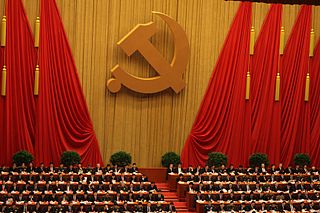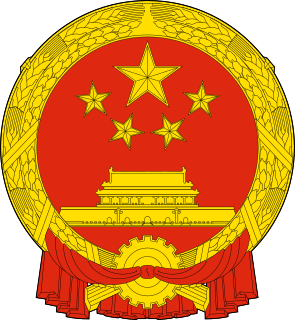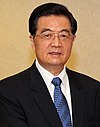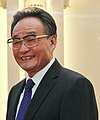A massive reform took place in China's cabinet, the State Council of the People's Republic of China. Several ministries were consolidated to form super ministries. The several "superministries" [3]
| New Ministry | Legacy depts | Areas of Responsibility | New sub agencies reporting |
|---|
| Ministry of Industry and Information | National Development and Research Commission (NDRC)
the Commission of Science Technology and Industry for National Defense
Ministry of Information Industry
State Council Information Office
State Tobacco Monopoly Bureau | Internet
Mobile Telecom
Landline Telecom
Postal Services
Internet Security
| State Postal Bureau |
| Ministry of Human Resources and Social Security | Ministry of Personnel
Ministry of Labour and Social Security
| Employment
Social Services | State Bureau of Civil Servants |
| Ministry of Environmental Protection | State Environmental Protection Administration | Environmental Protection
Enforcement | n/a |
| Ministry of Housing and Urban-Rural Construction | Ministry of Construction | Housing
Rural
Urban | n/a |
| Ministry of Transport | Ministry of Communications
Civil Aviation Administration of China | Road Transport
Air Transport
Water safety and Shipping | State Civil Aviation Bureau |
The state council will also create the National Energy Commission which will oversee national energy strategy, security and development. While the National Development and Reform Commission will continue to control the administration and regulation of the energy sector. [3]
The State Food and Drug Administration will be incorporated and come under the jurisdiction of the Ministry of Health. Therefore, the Health ministry will take over the responsibility for food and drug safety. [3] [4]
The People's Bank of China will increase its coordination role between all the financial executive agencies, namely the National Development and Reform Commission and the Finance ministry. [3]

The Politburo Standing Committee (PSC), officially the Standing Committee of the Central Political Bureau of the Communist Party of China, is a committee consisting of the top leadership of the Chinese Communist Party (CCP). Historically it has been composed of five to eleven members, and currently has seven members. Its officially mandated purpose is to conduct policy discussions and make decisions on major issues when the Politburo, a larger decision-making body, is not in session. According to the party's Constitution, the General Secretary of the Central Committee must also be a member of the Politburo Standing Committee.

The premier of the State Council of the People's Republic of China, abbreviated to Premier, sometimes also referred to informally as the Prime minister, is the head of government and leader of the State Council of China. The premier is nominally the principal advisor to the president of the People's Republic and holds the highest rank in the civil service of the central government.

Hu Jintao is a retired Chinese politician who served as General Secretary of the Chinese Communist Party (CCP) from 2002 to 2012, President of the People's Republic of China (PRC) from 2003 to 2013, and Chairman of the Central Military Commission (CMC) from 2004 to 2012. He was a member of the CCP Politburo Standing Committee, China's de facto top decision-making body, from 1992 to 2012. Hu was the paramount leader of China from 2004 to 2012.

Wen Jiabao, also spelled as Wen Chia-pao, is a retired Chinese politician who served as the sixth Premier of the State Council of the People's Republic of China and serving as China's head of government for a decade between 2003 and 2013. In his capacity as Premier, Wen was regarded as the leading figure behind Beijing's economic policy. From 2002 to 2012, he held membership in the Politburo Standing Committee of the Communist Party of China, the country's de facto top power organ, where he was ranked third out of nine members and headed by Party general secretary Hu Jintao.

Zeng Qinghong is a retired Chinese politician. He was a member of the Politburo Standing Committee of the Chinese Communist Party, China's highest leadership council, and top-ranked member of the Secretariat of the Central Committee between 2002 and 2007. He also served as the Vice-President of the People's Republic of China from 2003 to 2008.
Since both the Chinese Communist Party (CCP) and the People's Liberation Army (PLA) promote according to seniority, it is possible to discern distinct generations of Chinese leadership. In official discourse, each group of leadership is identified with a distinct extension of the ideology of the party. Historians have studied various periods in the development of the government of the People's Republic of China by reference to these "generations".
The 16th National Congress of the Chinese Communist Party was held in Beijing between November 8 and 14, 2002. It was preceded by the 15th National Congress of the Chinese Communist Party. 2,114 delegates and 40 specially invited delegates attended this and elected a 356-member 16th CCP Central Committee, as well as a 121-member Central Commission for Discipline Inspection (CCDI). The Congress marked the nominal transition of power between Jiang Zemin and Hu Jintao, who replaced Jiang as General Secretary, and a newly expanded Politburo Standing Committee line-up. The institutional transition would be completed in state organs by the 2003 National People's Congress in March. Jiang, however, remained head of the Central Military Commission, therefore in practice, the power transition was not complete. The Party National Congress examined and adopted the amendment to the Constitution of the Chinese Communist Party proposed by the 15th CCP Central Committee, and decided to come into force as from the date of its adoption. An amendment to the Constitution was approved the Party National Congress, with Jiang Zemin's signature ideology of "Three Represents" written into it. This congress was succeeded by the 17th National Congress of the Chinese Communist Party.

Li Keqiang is a Chinese politician. He became premier of the State Council of the People's Republic of China on 15 March 2013.
The 17th National Congress of the Chinese Communist Party was held in Beijing, China, at the Great Hall of the People from 15 to 21 October 2007. Congress marked a significant shift in the political direction of the country as CCP General Secretary Hu Jintao solidified his position of leadership. Hu's signature policy doctrine, the Scientific Development Concept, which aimed to create a "Socialist Harmonious Society" through egalitarian wealth distribution and concern for the country's less well-off, was enshrined into the Party Constitution. It was succeeded by the 18th National Congress of the Chinese Communist Party.

Wang Zhaoguo is a retired Chinese politician who came to prominence during the era of Deng Xiaoping. An automobile factory technician by trade, Wang had a long and varied political career, known for having acquired a ministerial-level position at the age of 41. Before entering the Politburo of the Chinese Communist Party in 2002, he successively served as the First Secretary of the Communist Youth League, the chief of the party's General Office, Secretary of the Central Secretariat, Governor of Fujian, Head of the United Front Work Department and Vice-Chairman of the CPPCC.
The 16th Politburo of the Chinese Communist Party was elected by the 16th Central Committee of the Chinese Communist Party on November 15, 2002. It was nominally preceded by the 15th Politburo of the Chinese Communist Party. This was the main vanguard executive committee functioning within the Politburo Standing Committee of the Chinese Communist Party. It was formally superseded by the 17th Politburo of the Chinese Communist Party.
The 15th Politburo of the Chinese Communist Party was elected by the 15th Central Committee of the Chinese Communist Party on September 19, 1997. It was preceded by the 14th Politburo of the Chinese Communist Party. It served until 2002.
The 14th Politburo of the Chinese Communist Party was elected by the 14th Central Committee of the Chinese Communist Party on October 19, 1992. It was preceded by the 13th Politburo of the Chinese Communist Party. It served until 1997. It was succeeded by the 15th Politburo of the Chinese Communist Party.
The 17th Central Politburo of the Chinese Communist Party was elected by the 17th Central Committee of the Chinese Communist Party on October 22, 2007. Eventually, four members of this Politburo were expelled from the Communist Party for not adhering to the leading party thought. They were, in order of the time of expulsion, Bo Xilai, Xu Caihou, Zhou Yongkang, and Guo Boxiong. This politburo was preceded by the 16th Politburo of the Chinese Communist Party and succeeded by the 18th Politburo of the Chinese Communist Party.

The 18th National Congress of the Chinese Communist Party began on November 8, 2012 at the Great Hall of the People. It was preceded by the 17th National Congress of the Chinese Communist Party. Due to term and age limits restrictions, seven of the nine members of the powerful Politburo Standing Committee (PSC) retired during the Congress, including Hu Jintao, who was replaced by Xi Jinping as General Secretary of the Chinese Communist Party. The Congress elected the 18th Central Committee of the Chinese Communist Party, and saw the number of Politburo Standing Committee seats reduced from nine to seven. It was succeeded by the 19th National Congress of the Chinese Communist Party.

The National Energy Commission is an interdepartmental coordinating agency of the State Council established in 2010 to coordinate the overall energy policies for the People's Republic of China. The body includes 23 members from other agencies such as environment, finance, central bank, National Development and Reform Commission.

The Xi–Li Administration of the People's Republic of China began in 2013, when Xi Jinping and Li Keqiang succeeded Hu Jintao and Wen Jiabao following the 18th National Congress of the Chinese Communist Party. It is speculated that Xi will solidify the political power of the General Secretary of the Chinese Communist Party, for the absolute command of the Communist ideology over pragmatic approach, and on the economic front there will be no liberalization but socialist entrenchment.

The Central Financial and Economic Affairs Commission, formerly known as the Central Leading Group for Financial and Economic Affairs from 1989–2018, is a commission of the Central Committee of the Chinese Communist Party at the dependence of the CCP Politburo in charge of leading and supervising economic work of both the CCP Central Committee and the State Council. The Commission is headed by CCP General Secretary or Premier of the State Council.
The 2012 SCO summit was the 12th annual summit of the Shanghai Cooperation Organisation.
The 1st Session of the 10th National People's Congress was held from March 5 to March 18 in Beijing, China, in conjunction with the 2003 session of the Chinese People's Political Consultative Conference.














